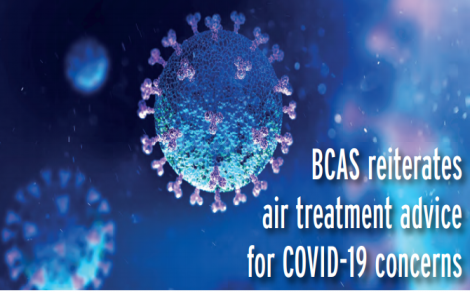BCAS reiterates air treatment advice for COVID-19 concerns

Following ongoing enquiries, the British Compressed Air Society (BCAS) is reiterating its advice to compressed air users to adhere to air treatment best practice during the Coronavirus pandemic.
Early in the pandemic there were claims that compressed air may be a potential source of Coronavirus COVID-19, requiring the installation of sterile air filters (or more frequent filter sterilisations and element changes) to prevent the contamination of food, beverage or pharmaceutical products. At this time, BCAS issued a statement of guidance quoting the World Health Organisation’s (WHO) position that Coronavirus COVID-19 was not an airborne virus.
On 9 July 2020 the WHO updated its guidance to include the possibility of airborne transmission of the virus, stating that: “Short-range aerosol transmission, particularly in specific indoor locations, such as crowded and inadequately ventilated spaces over a prolonged period of time with infected persons cannot be ruled out.
“However, the detailed investigations of these clusters suggest that droplet and fomite transmission could also explain humanto- human transmission within these clusters. Further, the close contact environments of these clusters may have facilitated transmission from a small number of cases to many other people (e.g., superspreading event), especially if hand hygiene was not performed and masks were not used when physical distancing was not maintained.”
BCAS has therefore updated its guidance to include the possibility of airborne/aerosol transmission1, but would like to reassure users that this does not impact or change the previously stated advice about the risk and management of Coronavirus in relation to their compressed air system.
The simple facts:
Compressor rooms are well ventilated.
There is minimal risk of short-range aerosol transmission at the point of compressor intake.
At the point of compression, the air temperature is high, the heating time is short and with the compression processes, viruses do not tend to survive.
During compression, the compressed air temperature is higher than the temperature needed to kill COVID-19. It is documented that heat at 56degC kills the Coronavirus.
Appropriate downstream purification systems typically treat the compressed air to aerosol sizes significantly smaller than those referenced by the WHO (human generated aerosols <5 micron, good filtration down to <0.01 micron)
The compressor has two-stage filtration (panel and intake filter) prior to compression. Air is drawn into an air compressor, through panel filters and then through intake filters on its way to the compression chamber. Ambient air contaminants would have to remain in aerosol form to pass through panel and intake filters in order to enter the compressor intake. This is highly unlikely, but even if panel and intake filtration was compromised, the contaminant would not remain in aerosol form during compression.
Best practice guide 102
BPG102 includes guidance on the installation of appropriate inline coalescing filtration and its regular maintenance, as these will remove multiple contaminants include micro-organisms, oil and water aerosols. In addition, the guidance recommends using a dewpoint of -40degC to inhibit the growth of microorganisms, and filtration to reduce the micro-organisms and particulate.
The specification requires the installation of a minimum of two aerosol reduction filters (down to 0.01mg/m3 of oil aerosol and particle reduction down to 0.01 micron). These protective measures will ensure that, in the unlikely event that the COVID19 or other virus still survive the heat of compression, aerosol reduction filters in the compressor room combined with a very low dewpoint and point-of-use dry particulate filters will remove the risk from compressed air.
To see the previous guidance, visit https://www.bcas.org.uk/article/covid-best-practice84.aspx.BPG102 is available for free download from the BCAS website. Visit https://www.bcas.org.uk/websiteform/foodbeverage-grade-compressed-air-best-practice-guideline-102-5.aspx
For further information visit the BCAS website at www.bcas.org.uk or call the technical helpline on 0207 935 2464.
1 see BG102 for compressed air purity and BPG104 for best practice advice on the filtration and drying of compressed air at www.bcas.org.uk
-
PPMA 2025
23 September, 2025, 9:30 - 25 September, 2025, 16:00
NEC, Birmingham UK -
Advanced Engineering Show 2025
29 October, 2025, 9:00 - 30 October, 2025, 16:00
NEC, Birmingham UK










